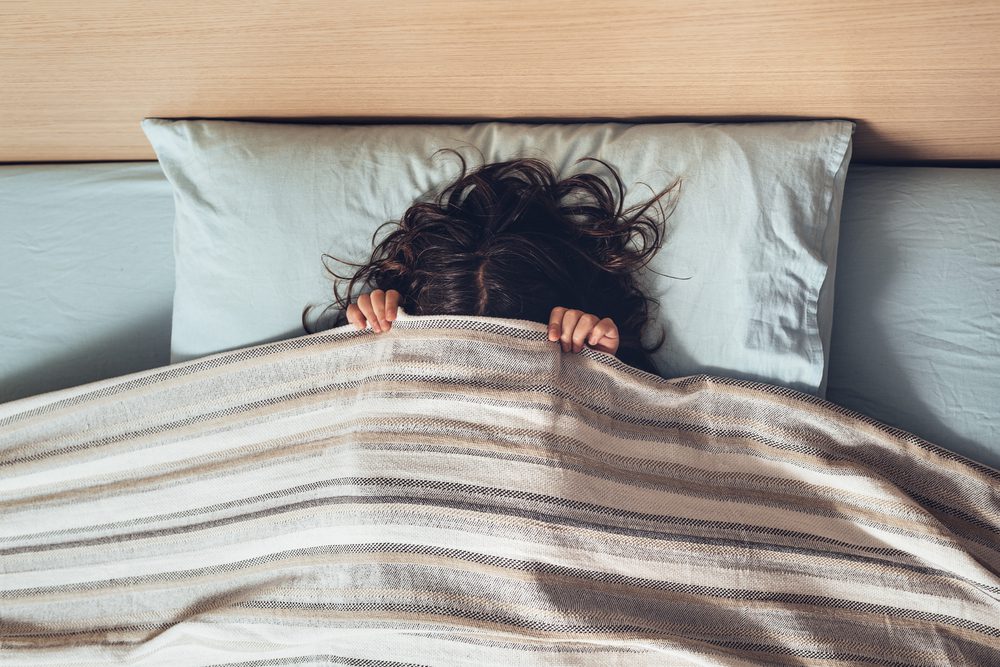Confusional arousal, also known as “sleep drunkenness,” is a sleep disorder in which a person seems to wake up but is disoriented and confused. Someone with confusional arousal may act strangely, speak slowly, and not be aware of what they are doing.
Confusional arousal affects up to 17% of children, but it is uncommon in adults. Although confusional arousal is usually not serious, the episodes can be alarming for a bed partner or caregiver to witness. It can be helpful to know what causes confusional arousal, as well as how it’s diagnosed and treated.
What Are the Signs of Confusional Arousals?
People with confusional arousal have difficulty waking from non-rapid eye movement sleep (NREM). Confusional arousals begin when a person wakes up in bed disoriented. They may seem to be awake because their eyes are open, but they are usually still partly asleep and unaware of what’s going on.
These episodes usually happen during deep periods of NREM sleep and typically last less than 15 minutes. During a confusional arousal, a person may not respond to other people or their surroundings. They may also speak slowly and incoherently and be unable to recall the event later.
Confusional arousal shares some symptoms with other arousal disorders such as sleepwalking and night terrors. However, as opposed to these disorders, people experiencing confusional arousal usually don’t get out of bed or display signs of fear.
What Causes Confusional Arousals?
Confusional arousal may be due to different levels of activation in certain parts of the brain that make it difficult for a person to fully wake up. Lack of sleep and various conditions that disrupt sleep can lead to confusional arousals, especially when several of them occur together.
- Sleep deprivation: Not getting enough sleep may cause or worsen episodes.
- Sleep disorders: Obstructive sleep apnea (OSA) can cause people to wake up frequently throughout the night when their breathing is disrupted and potentially trigger confusional arousals. Other sleep disorders that interrupt sleep, such as periodic limb movements of sleep (PLMS), may also lead to confusional arousals.
- Psychiatric disorders: People with psychiatric disorders often experience confusional arousals.
- Physical conditions: Pain, stress, fever, menstruation, or bladder problems can all bring about an episode.
- Environmental triggers: Anything that may wake someone up, such as a bright light or a loud noise, could potentially bring on a confusional arousal.
- Certain medications: Taking sleeping pills or sedatives before bed could set off an event.
While several of these factors can prompt an episode of confusional arousal, it’s not clear why someone may have an episode one night but not others.
Impact of Confusional Arousals on Sleep
Sleep-related arousal disorders can impact a person’s sleep and daily functioning. Children who experience sleep disorders may resist going to bed, have a harder time falling asleep, wake up more during the night, and get less overall sleep.
While most confusional arousals are harmless, sometimes a person may become violent or harm themselves while in a disoriented state. Confusional arousals can also lead to sleepwalking, in which a person leaves their bed and engages in potentially dangerous activities while they are asleep, such as driving or cooking.
What Are the Risk Factors for Confusional Arousals?
Young age is a risk factor for confusional arousal, with most episodes in children beginning around age two. Confusional arousals decrease as a child reaches adolescence, becoming rare in adulthood.
Only around 4% of adults have confusional arousals, which may be related to underlying mental health issues or other sleep disorders. People with sleep apnea or restless legs syndrome may have a higher risk of developing confusional arousal.
In addition, there are several other risk factors for confusional arousal.
- Family history: Having a relative who sleepwalks or has night terrors may raise your risk of developing a sleep-related arousal disorder. Approximately 80% of cases involve a family history of one of these disorders.
- Shift work: Working nights, evenings, or other irregular shifts may also raise your risk of confusional arousal due to a disturbed sleep-wake cycle.
- Circadian rhythm disturbances: Events that disrupt your normal sleep schedule, such as jet lag, can increase your risk.
- Other lifestyle habits: Not getting enough sleep, being under substantial stress, or taking certain psychiatric or sedative medications may also increase your risk.
Diagnosing Confusional Arousals
In order to diagnose confusional arousal, a doctor usually asks for a thorough history of when symptoms began and how often they occur. A doctor may also ask about:
- Family history
- Sleep habits
- Other medical issues or sleep disorders
- Medication use
Sometimes, doctors may ask to review home video footage of the person sleeping in order to help identify symptoms. This can also help the doctor distinguish confusional arousal from other conditions, such as sleep-related seizures, psychiatric disorders, and other sleep disorders.
These steps are usually enough to diagnose or rule out confusional arousal. But in certain circumstances, a doctor may ask the person to participate in a sleep study in order to better observe their sleep patterns.
Treating Confusional Arousals
Confusional arousal treatment is intended to lower the frequency of the episodes and protect the person from harming themselves or others. Treating confusional arousals directly with medication is rarely needed.
If you live with a person with confusional arousal, it’s important to know the best way to handle an episode. Medical experts suggest that people avoid shouting or responding with physical force. Instead, they recommend calmly helping the person back into bed.
Several behavioral changes and therapeutic approaches may help reduce confusional arousals.
- Good sleep hygiene: Healthy sleep habits, such as going to bed and waking up at consistent times, may reduce confusional arousal episodes.
- Avoiding alcohol and certain medications: Alcohol and certain psychiatric and sedative medications may trigger arousal disorders. Always speak with your doctor before stopping a prescribed medication.
- Safe sleeping environment: If episodes are severe, make sure the bedroom is safe by removing dangerous items from reach, securing windows, and moving the mattress closer to the ground.
- Cognitive behavioral therapy: Some evidence has shown that cognitive behavioral therapy for insomnia (CBT-I) may help treat confusional arousal.
- Treatment of the underlying illness: Addressing any potential underlying causes of confusional arousal, such as lack of sleep or sleep apnea, may lower the number of episodes.
References
Get Your Sleep Questions Answered Live on 4/30
Have questions about sleep? Get all your sleep-related questions answered in a Live Q&A on YouTube with renowned sleep expert Dr. Michael Breus at 5 p.m. PST/8 p.m. EST.







